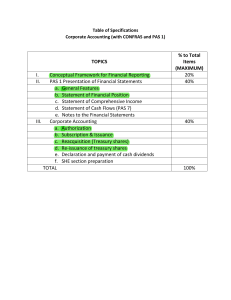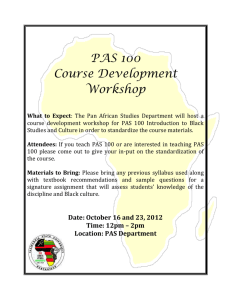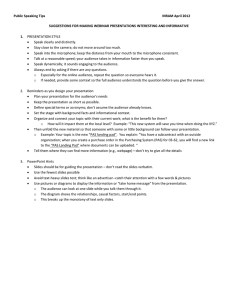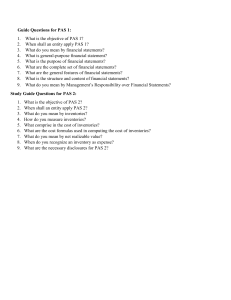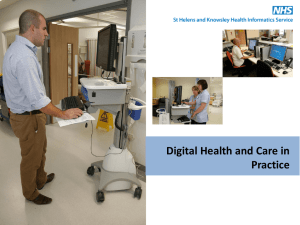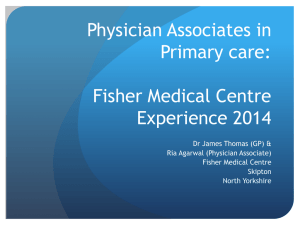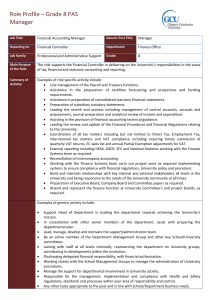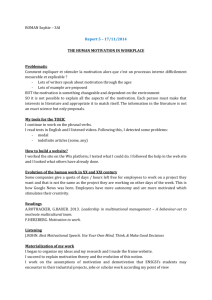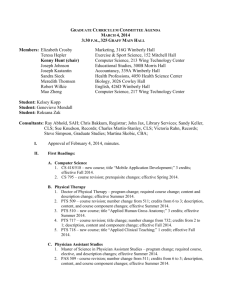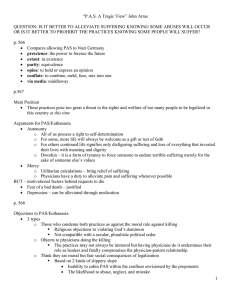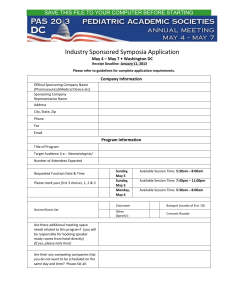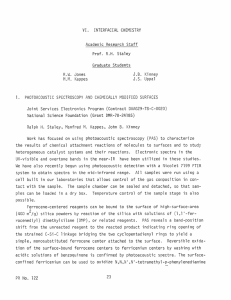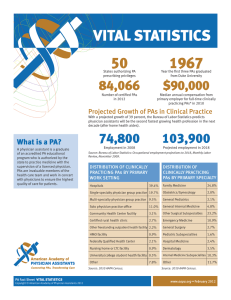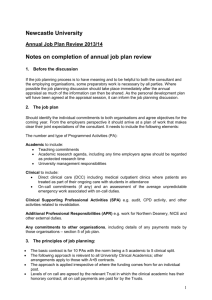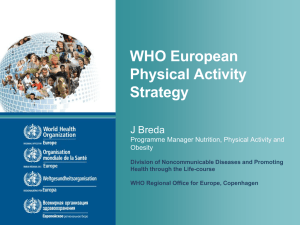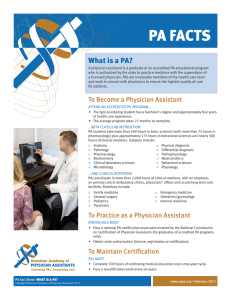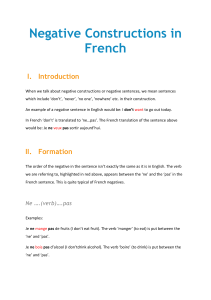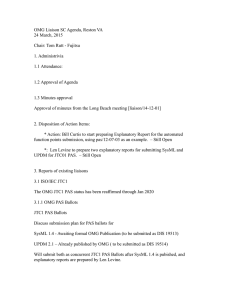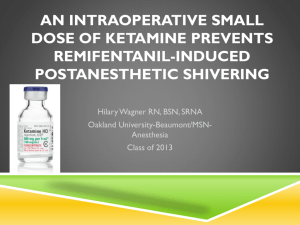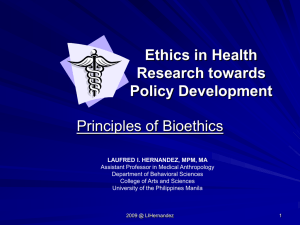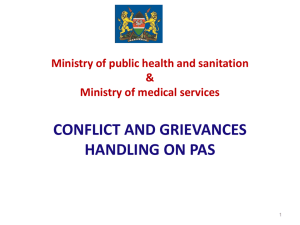presentation
advertisement
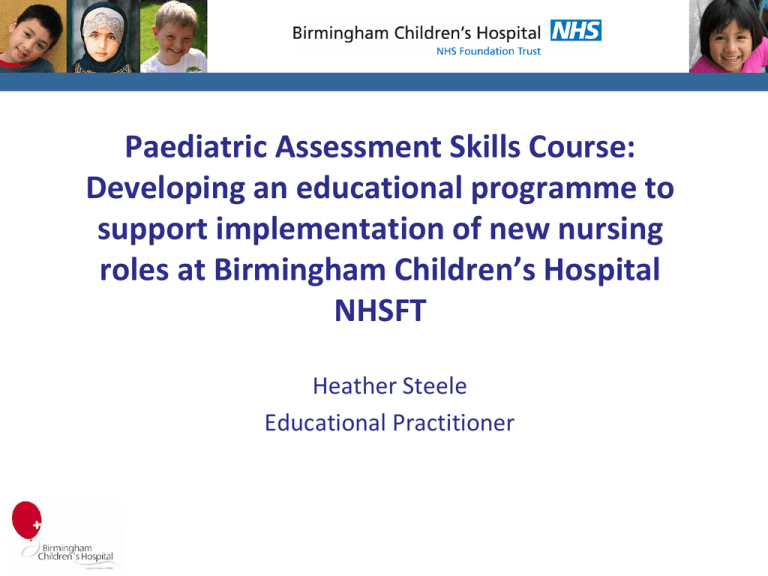
Paediatric Assessment Skills Course: Developing an educational programme to support implementation of new nursing roles at Birmingham Children’s Hospital NHSFT Heather Steele Educational Practitioner Course Development: • Driven by the need to develop new nursing roles to support EWTD and HAN implementation in April 2008 • Commitment from consultants/ ANPs Vision: • To provide an opportunity for experienced nurses to develop ‘advanced’ knowledge, skills and attitudes to enhance the quality of care delivered to CYP in an acute healthcare setting • Flexible approach to skills acquisition Course development: • Aimed at Band 6 Practitioners and above • Masters level critical analysis • Interactive approach to skills development • Competencies available in a PAS Skills Passport • Use of an apprenticeship model of learning with experienced Clinical Supervisors Course Delivery: • Implementation of a 3-day Course in January 2008 with 4 courses • Course extended to 5 days • Successful RCN accreditation at the beginning of 2009 Interactive Approach: The more you learn, the more you know, The more you know, the more you forget The more you forget, the less you know So……… why learn? PAS Course Structure: Pre course Revision Workbook Day 1: • Introduction to history taking/ documentation • Recognition of the sick child • Critical thinking and clinical decision making • Assessment of the respiratory/ ENT systems PAS Course Structure: Day 2: • Assessment of the CVS/ ECG interpretation • Blood gas analysis • Assessment of the neurological system • Abdominal assessment PAS Course Structure: Day 3: • Clinical assessment of fluid balance and shock • Assessment of the skin • Assessment of the febrile child • Initiatives supporting practice development/ quality PAS Course Structure: Day 4: • Workshops practising history taking skills and examination skills • Use of simulation to ‘put it all together’ • Implications of advancing practice and accountability PAS Course Structure: Day 5: Spent practising skills with a Clinical Supervisor in a clinical area of choice H = History E = Examination L = Logical deduction P = Plan of management “Look and you should see. Ask and you should be answered!” Thinking about Critical Thinking: The difference between child-like thinking and adult thinking and between the expert/ non-expert approaches PAS Course Attendance: • Course completed by 11 cohorts to date • 125 nurses and 1 AHP • Mainly internal plus 16 external participants PAS Course Attendance: Also pleased to have been joined by 6 senior nurses from Queen Elizabeth Hospital in Blantyre, Malawi PAS Course Evaluation: Feedback overwhelmingly positive, with specific comments highlighting the excellent use of speakers and resources “Excellent course, I feel I have learnt many new skills and theory which I can apply to my everyday practice” Measuring Impact: • Evidence of positive impact on skills acquisition and service development • Majority of participants (91.4%) report enhanced skills post course completion • 72% using skills in a clinical role and 8% in an educational role Skills Acquisition: • History taking (66.6%) • Assessment of the sick child (97.2%) • Respiratory examination (60.6%) • Assessment of the skin (100%) • Blood gas interpretation (50%) • Review of CXRs (52.9%) ‘For me the practising skills is still in progress as I get to do it on a daily/weekly basis. It is a work in progress so I still don’t have the final competencies signed yet. I have started doing pre-admission clinic for cardiac catheter patients so am using the majority of what I learnt during the course during these clinics. The only skill I am not practicing and don’t think I will is neurological limb tone assessment.’ I found it an excellent course, completely relevant to my job role’. Developments in 2011: • Submission of reflection for course completion • Accreditation with local university, alongside a portfolio of clinical modules to develop an ENP role • Continuing educational innovation! Challenge Zone Impact of the PAS Course at BCH NHSFT: • Improved individual knowledge and skills • Evidence of improved quality care and patient safety • Development of new nursing roles • Innovation in clinical practice Thank You
